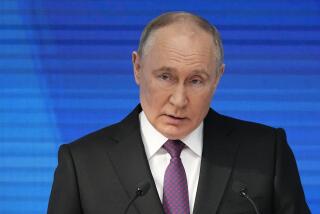Gorbachev Should Stop Move to ‘Dictatorship,’ Yeltsin Says
- Share via
NEW YORK — In a television interview to be aired tonight, Russian Republic President Boris N. Yeltsin says Soviet President Mikhail S. Gorbachev should abandon “his attempts to set up a dictatorship” or resign.
Yeltsin says in the “20/20” interview with ABC’s Barbara Walters that, if Gorbachev continues his move to the right, four republics--Russia, the Ukraine, Byelorussia and Kazakhstan--would unite and set up a union. He said the heads of the republics would rotate to lead the union and there would not be a single strongman.
In addition, he said in the interview conducted in Moscow last week that the Baltic republics should be independent “if they want it.”
The text of the interview was given to news organizations in advance of broadcast.
Yeltsin also said the United States should conclude a separate treaty with the Russian Federation.
“We have independent foreign policy, and we have the right to conclude such a treaty,” he said through an interpreter.
Yeltsin said the current crisis in the Baltics was leading the country to the verge of civil war and he held Gorbachev responsible for civilians killed by troops.
In Moscow, meanwhile, Yeltsin failed Thursday to win sufficient support in the Russian Legislature for a resolution condemning the use of military force against civilians in the Baltic republics.
Hard-line Communists succeeded in blocking the resolution, arguing that it did not contain any criticism of the pro-independence legislatures of the Baltics.
Many progressive politicians believe that Russia, the largest and wealthiest of the Soviet Union’s 15 republics, could be the next target if the Kremlin succeeds in reasserting central control in the Baltics.
The draft will now be sent back to the individual chambers of the Russian Legislature before being resubmitted to the full Parliament.
During backstage negotiations earlier this week, the draft resolution had been watered down to exclude direct criticism of Gorbachev. But it did suggest that Interior Minister Boris Pugo and KGB chief Vladimir Kryuchkov bore direct responsibility for the deaths of at least 13 civilians in Lithuania and four in Latvia at the hands of Soviet security forces.
More to Read
Sign up for Essential California
The most important California stories and recommendations in your inbox every morning.
You may occasionally receive promotional content from the Los Angeles Times.













